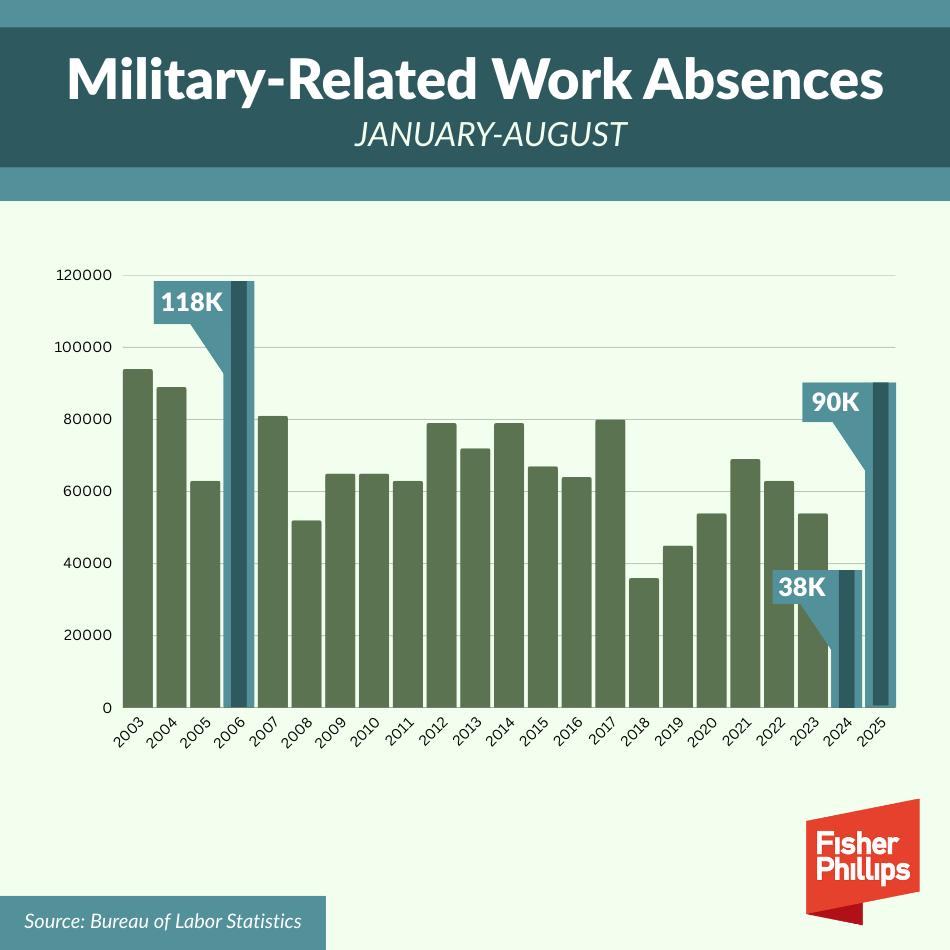The deployment of National Guard and other military personnel is at its highest rate in almost 20 years, and there’s a likely chance that one or more of your employees will miss time from work because of military service in the near future. But did you know that federal law creates obligations that go well behind what you might expect from typical worker protection statutes? If you’re not familiar with the Uniformed Services Employment and Reemployment Rights Act (USERRA), or you need a refresher, this Insight will provide you with a solid overview of the law and your responsibilities.
Why Now?
According to recent data from the Bureau of Labor Statistics, employers reported over 90,000 instances of workers missing at least a week of work because of military deployments or other civil service during the first eight months of the year. That doubles last year’s numbers and marks the highest level since 2006 during the Iraq and Afghanistan conflicts.
The reason for this spike can be attributed to the administration’s deployment of National Guard personnel to Washington, D.C., Los Angeles, and elsewhere. Given the recent announcement of an expansion of Guard personnel to Memphis and perhaps other cities, we only expect these numbers to rise for the foreseeable future.
|
USERRA Basics There’s a broad federal pro-employee statute that significantly restricts the way that employers can treat covered employees: USERRA. It provides three major categories of employer obligations:
|
Is My Workplace Covered?
Yes. USERRA applies to all employers – private and public – regardless of the number of workers. Even if you had just one employee, you’d owe USERRA protections to them. It doesn’t matter if you are non-profit or a quasi-governmental organization, or if you’re a foreign employer with operations in the US. If you are an employer in the United States and you’re reading this Insight, you are covered by USERRA.
Which Employees are Covered?
To establish USERRA eligibility, an employee must meet the following four conditions:
- They hold a civilian job and have a reasonable expectation that employment will continue indefinitely or for a significant period.
- They have provided advance written or verbal notice that they intend to leave for service (or training, in some cases). However, in cases of emergency, as well as circumstances where it is unreasonable to provide notice, failure to do so is excused.
- They engage in service that does not exceed the five-year cumulative limit of time to be released honorably from service.
- They subsequently submit a timely application for re-employment, or report back for work in a timely fashion.
Does it Matter That a Worker Volunteered for Service?
No. USERRA covers both voluntary and involuntary service. If an employee volunteers for service and is placed on orders activating them for service, then the service is covered under USERRA. If an employee volunteers to serve with the relief effort but is not ordered to active service under any federal program, they would not qualify for USERRA protection.
What Reinstatement Rights Do Workers Have?
USERRA-eligible employees are not only entitled to immediate reemployment when they return from military duty, but employers must promptly reinstate them to the job they would have held had they not left, including appropriate promotions or pay increases. This “escalator” principle is one of the biggest overlooked responsibilities that catches employers by surprise.
- If possible, employers should return employees to the same or a comparable position with the same seniority, status, and pay.
- You should ensure employees accrue seniority and seniority-based benefits during their leave as though continuously employed.
Do Employees Have to Provide Advance Notice of Their Leave?
Yes, they must provide advance written or verbal notice of military duty in order to be covered by the statute. However, there is a broad exception that allows this notice to be excused in cases of military necessity or when it is deemed “otherwise unreasonable.”
When Do Employees Need to Inform Us They Have Returned?
Employees must request reemployment within specific time frames following their return from service.
- Under 31 days of service: the next workday
- 31 to180 days: within 14 days
- Over 180 days: within 90 days
Employees are eligible for longer extensions in the event they have sustained injuries during their time of service. Check with your FP counsel for more detail, but any worker that has been hospitalized or is convalescing from an injury incurred or aggravated during leave can be eligible for an extension up to two years.
What About Health Insurance and Benefits Continuation?
Employees may elect to continue employer-based health coverage for up to 24 months during military service, similar to COBRA coverage. Upon return, employers must reinstate workers to their health plan without waiting periods or exclusions (excluding pre-existing condition clauses for service-related conditions).
Are There Accommodation Obligations?
Yes, employers must make reasonable efforts to accommodate any disabilities incurred or aggravated during military service, including training or retraining to qualify for a comparable position. If the employee can’t perform the original job due to the disability, you must offer a position with equivalent seniority, pay, and status (as far as possible).
What About Subsequent Terminations?
You are restricted in the ways you can terminate workers after USERRA-protected leave. They are no longer pure “at will” employees for a period of time following reemployment. If the deployment was for more than 30 but less than 180 days, you can only terminate a returning worker “for cause” for 180 days following reemployment, or for one year if the length of deployment exceeded 180 days.
Are There Any Defenses and Exceptions?
- In extremely rare cases, you may be able to rely on an undue hardship defense. If an employer can prove that reemployment would cause undue hardship or would be impossible/unreasonable to provide (such as severe business changes that took place during the absence), compliance might be excused by a court or investigator. However, beware: this defense is narrowly interpreted.
- Another possible defense: service members dishonorably discharged or separated under “other than honorable” conditions are not entitled to USERRA protections.
What Consequences Could We Face For Violations?
- If an employee can prove that you committed a willful violation, they could recover double damages for lost pay and benefits and attorneys’ fees.
- As of 2025, thanks to The Dole Act, they could also recover minimum liquidated damages of $50,000 per violation for “knowing” noncompliance – even in situations where they lost no pay or benefits.
- Employees could also obtain preliminary or permanent injunctive relief in cases where violations are ongoing or imminent.
Conclusion
Fisher Phillips will continue to monitor workplace trends and provide additional guidance as necessary, so make sure you are subscribed to Fisher Phillips’ Insight System to get the most up-to-date information directly to your inbox. If you have further questions, contact your Fisher Phillips attorney, the authors of this Insight, or any attorney in our Employee Leaves and Accommodations Practice Group.




